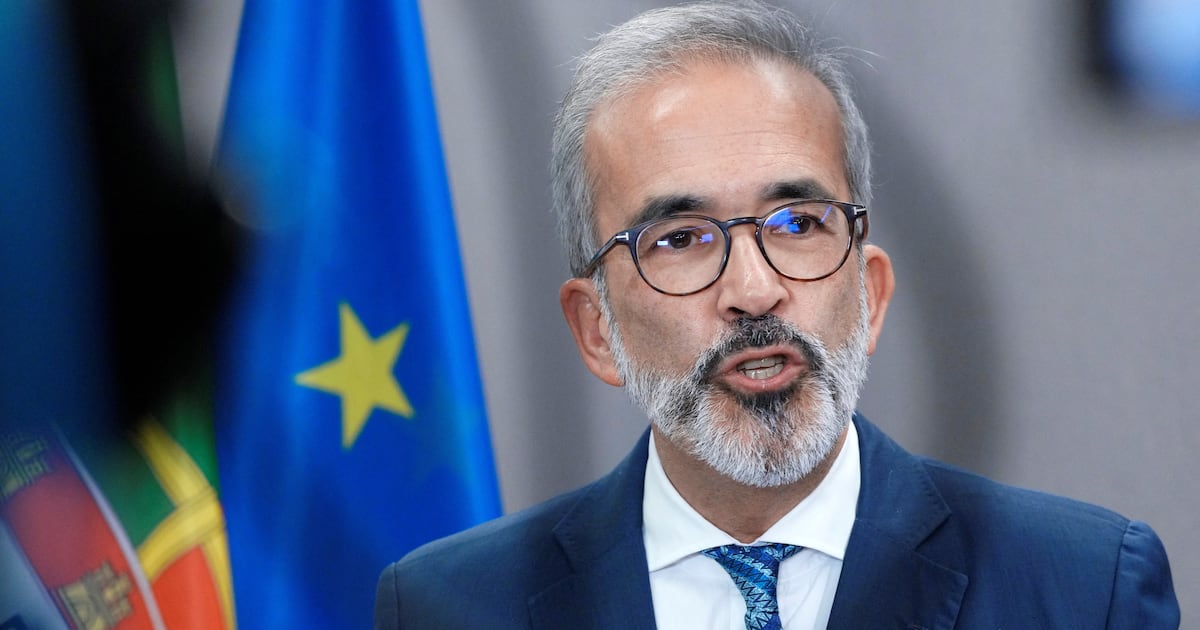The EU’s 27 states could adopt a proposal to suspend preferential tariffs with Israel, Portugal’s Foreign Minister Paulo Rangel told The National, in what would be the bloc’s first co-ordinated move against the Israelis over the Gaza war.
Speaking in New York shortly after Portugal’s recognition of Palestinian statehood alongside a dozen other countries, Mr Rangel described it as a “huge step” and expressed regret at Israel’s rejection of their decision.
Discussing Portugal’s role as a “bridge builder”, Mr Rangel answered “probably” when asked whether the EU council would adopt a proposal recently tabled by the EU Commission, the bloc’s executive arm, to increase tariffs on imported commercial goods from Israel.
He said Portugal had worked closely with Denmark and Greece to find consensus that could pressure Israel to uphold international values.
Big states
The proposed measure would affect a little more than one third of Israel’s exports to the EU, including fruit and rubber products. It would cost the Israeli economy, whose largest single trading partner is the EU, €227 million ($268) annually.
For the proposal to pass, it needs a qualified majority- 55 per cent of countries and 65 per cent of the population. That makes the support of major nations such as Italy or Germany crucial.
In a signal of Europe’s increasing condemnation of Israel’s war on Gaza, the EU Commission paused bilateral support to Israel worth at least $37 million this month. It also suggested sanctioning two extremist Israeli government ministers, Itamar Ben Gvir and Bezalel Smotrich, who support the settler movement.
The latest move, however, requires unanimous support to be adopted, which remains unlikely. A number of countries, including Hungary and the Czech Republic, remain supportive of Israel.
Last week, German Chancellor Friedrich Merz said he would clarify his position before an EU meeting in Copenhagen on October 1. His country is particularly scrutinised due to its reluctance to appear to be taking punitive measures against Israel over the Holocaust.
Portugal, for its part, supports both the EU Commission’s proposals. “We are in favour of the measures that were announced by the Commission,” Mr Rangel said. He added that his country has not taken unilateral measures against Israel – unlike Slovenia and Spain, which have already issued a visa ban on the two Israeli ministers – because Portugal is in favour of creating consensus within the EU.
Recognising Palestine should not be viewed as a punishment by Israel, Mr Rangel said. “We are a country that is a friend of Israel,” he said. “So when we recognise Palestine, we are not doing anything against Israel. And so for us, we regret that the Israeli government has been essentially passing the message that two-state solution is not possible or is not desirable.”
Mr Rangel suggested the three pillars of the French-Saudi initiative as a basis for a two-state solution, which was backed in a UN General Assembly vote last week by Portugal and more than 140 other nations.
They include Palestinian statehood recognition by western states and a disposition towards recognising Israel by Arab states that have not already done so. Also among commitments is a promise by the Palestinian Authority to reform its government and hold elections next year.
Mr Rangel said that while he understood the “frustration” caused by the absence of a Palestinian state on the ground, despite recognition, the French-Saudi road map could prevent further Israeli actions that undermine the two-state solution.
Highlighting “the displacement of people in Gaza Strip, or the expansion of settlements all across the West mark or East Jerusalem”, he said: “This naturally is something that we have to stop in order to ensure that it is possible to create a state with all the capacity that any state in the world has.”
